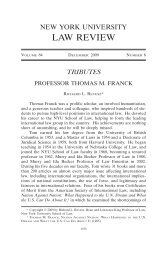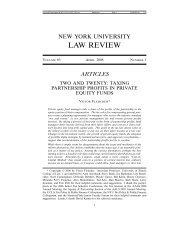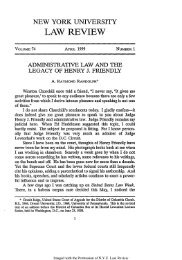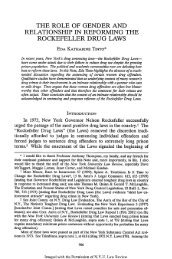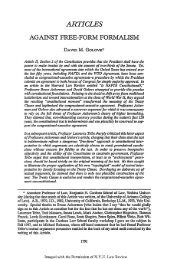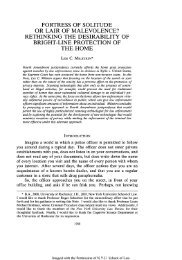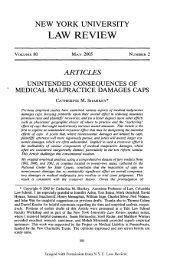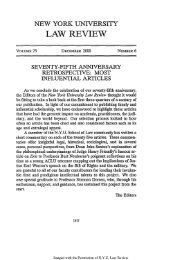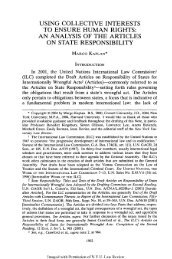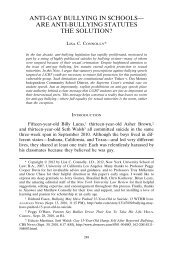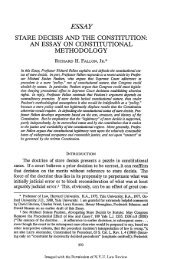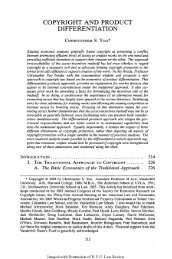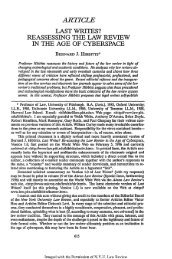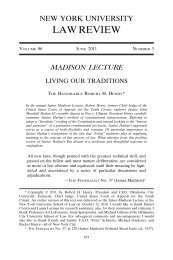Immigrants and the Right to Petition - NYU Law Review
Immigrants and the Right to Petition - NYU Law Review
Immigrants and the Right to Petition - NYU Law Review
Create successful ePaper yourself
Turn your PDF publications into a flip-book with our unique Google optimized e-Paper software.
Imaged with <strong>the</strong> Permission of N.Y.U. School of <strong>Law</strong><br />
NEW YORK UNIVERSITY LAW REVIEW<br />
[Vol. 78:667<br />
statements in Verdugo-Urquidez. The <strong>Petition</strong> Clause drafters apparently<br />
did not underst<strong>and</strong> <strong>the</strong> terms "<strong>the</strong> people," "every person," <strong>and</strong><br />
''every man" <strong>to</strong> be anything but synonyms (<strong>to</strong> <strong>the</strong> extent <strong>the</strong>y gave <strong>the</strong><br />
terms any thought at all). 163 Nor is <strong>the</strong>re evidence in <strong>the</strong> legislative<br />
his<strong>to</strong>ry of <strong>the</strong> <strong>Petition</strong> Clause that its framers sought <strong>to</strong> restrict <strong>the</strong><br />
petitioning rights of immigrants, nor that <strong>the</strong>y desired <strong>to</strong> leave petitioners<br />
such as <strong>the</strong> much-publicized Acadian refugees outside <strong>the</strong> protection<br />
of <strong>the</strong> Clause. By July 1789, <strong>the</strong> same First Congress was<br />
considering a petition from an immigrant-on which it granted relief<br />
in September 1789.164 If <strong>the</strong> Verdugo-Urquidez analysis were correct,<br />
one would expect <strong>to</strong> find at least some evidence of an intent <strong>to</strong> exclude<br />
immigrants from <strong>the</strong> protections of <strong>the</strong> Clause.<br />
65<br />
The central congressional debate on <strong>the</strong> <strong>Petition</strong> Clause concerned<br />
an unsuccessful effort <strong>to</strong> extend <strong>the</strong> provision <strong>to</strong> include a right<br />
<strong>to</strong> "instruct" legisla<strong>to</strong>rs <strong>and</strong> <strong>the</strong>reby bind <strong>the</strong>m in <strong>the</strong>ir deliberations<br />
<strong>and</strong> voting. 166 Although <strong>the</strong> participants in this debate did not directly<br />
address <strong>the</strong> status of noncitizens as "people," 167 <strong>the</strong> discussion may<br />
offer some indirect support for <strong>the</strong> view of <strong>the</strong> Verdugo-Urquidez ma-<br />
163 In a House debate, Elbridge Gerry referred <strong>to</strong> "<strong>the</strong> petitions <strong>and</strong> instructions of our<br />
constituents," I Annals of Cong., supra note 161, at 765-66, which arguably suggests an<br />
assumption that only constituents-<strong>the</strong> enfranchised-could petition. Gerry, however, was<br />
addressing a motion <strong>to</strong> include a right <strong>to</strong> instruct representatives. Even if he were implying<br />
a dramatic break from his<strong>to</strong>ric practice by yoking petition rights <strong>to</strong> <strong>the</strong> franchise, this still<br />
would not have yielded an alienage classification for petitioning because noncitizens were<br />
not categorically excluded from <strong>the</strong> vote. See Raskin, supra note 134, at 1399-1400<br />
(describing alien suffrage in American colonies <strong>and</strong> after independence).<br />
164 See infra notes 193-204 <strong>and</strong> accompanying text.<br />
165 Over <strong>the</strong> course of House <strong>and</strong> Senate debate, Madison's draft <strong>Petition</strong> Clause, see<br />
text accompanying note 161 supra, was amended in two principal ways: by substituting <strong>the</strong><br />
verb "petition" for "applying ... by petitions, or remonstrances" <strong>and</strong> by substituting <strong>the</strong><br />
object "government" for "Legislature." The various drafts, amendments, <strong>and</strong> votes are set<br />
forth in Cogan, supra note 155, at 129-39; see also Andrews, supra note 89, at 611-21 (tracing<br />
legislative his<strong>to</strong>ry of <strong>Petition</strong> Clause). James Pf<strong>and</strong>er has argued that <strong>the</strong> First Congress's<br />
substitution of <strong>the</strong> term "government" for "Legislature" demonstrates an intent<br />
that <strong>the</strong> right <strong>to</strong> petition all three branches of government be secured by <strong>the</strong> <strong>Petition</strong><br />
Clause. Pf<strong>and</strong>er, supra note 90, at 956-59.<br />
166 Representative Tucker moved <strong>to</strong> add a formal right of instruction <strong>to</strong> <strong>the</strong> proposed<br />
amendment, 2 Cong. Reg., 1st Cong., 1st Sess. (Aug. 15, 1789), reprinted in Cogan, supra<br />
note 155, at 143, 144. After extended debate on popular sovereignty, <strong>the</strong> dangers of regionalism<br />
<strong>and</strong> factionalism, <strong>the</strong> value of a deliberative national body, <strong>and</strong> <strong>the</strong> impact on<br />
ratification prospects of including controversial provisions <strong>to</strong>ge<strong>the</strong>r with consensus amendments,<br />
Tucker's motion was defeated forty-one <strong>to</strong> ten. Id. at 198-217, reprinted in Cogan,<br />
supra note 155, at 144-58; see also Mark, supra note 84, at 2209-12 (reviewing congressional<br />
debate); id. at 2209 n.252 (describing colonial practice of "instruction," in which representative<br />
was obligated <strong>to</strong> vote in particular manner by constituents).<br />
167 The only comments regarding who constitutes "<strong>the</strong> people" capable of instruction<br />
was an exchange prompted by Representative Livermore, who wondered whe<strong>the</strong>r "<strong>the</strong><br />
people" refers <strong>to</strong> "a part of <strong>the</strong> people in a <strong>to</strong>wnship or district, or ... <strong>the</strong> state legislatures"<br />
2 Cong. Reg., 1st Cong., 1st Sess. (Aug. 15, 1789), reprinted in Cogan, supra note



